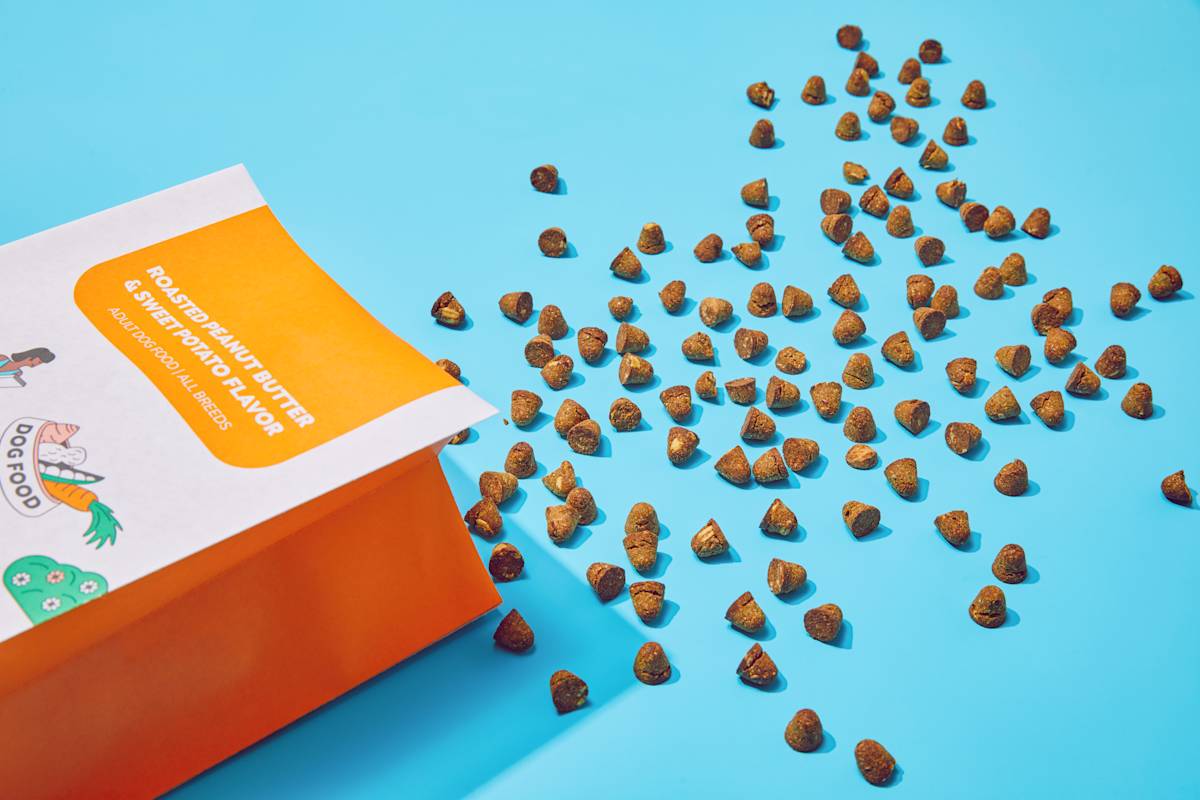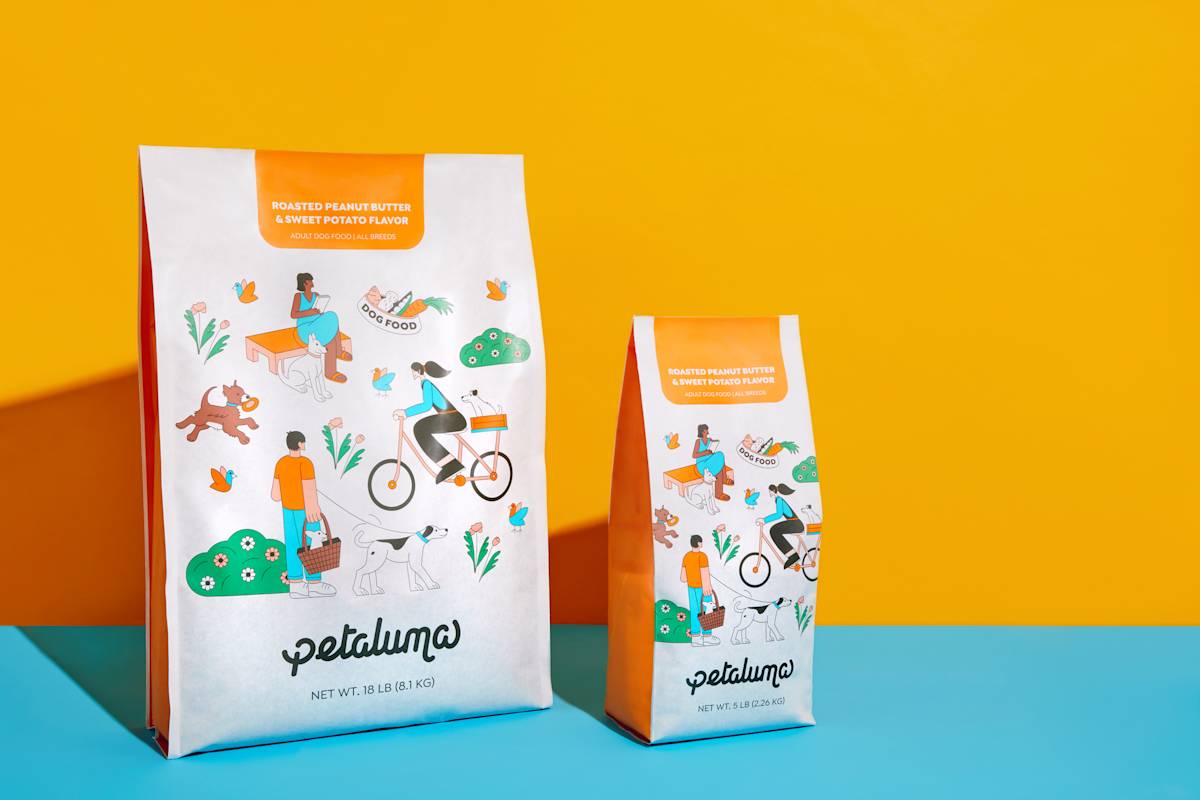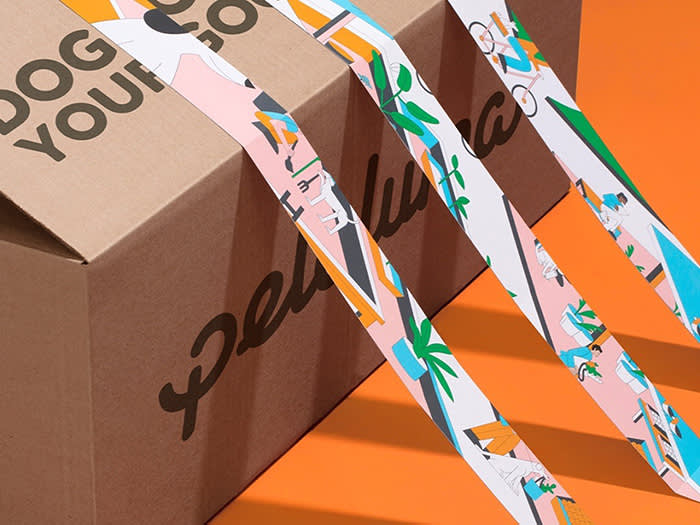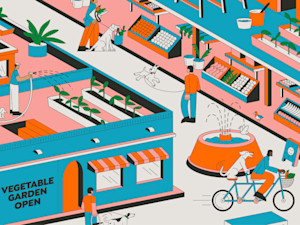Petaluma Is Getting Dogs to Eat Their Veggies
The brand’s plant-based, protein-packed dog food and treats are sure to satisfy your pup’s appetite and your sustainability concerns.

Share Article
Anyone who’s watched one of the 47 available Netflix documentariesopens in new tab on the subject can tell you the meat industry has a complicated relationship with the environment. As the streamer’s extensive content creation can attest, it’s something that can often feel increasing jarring the more you research it. “The agricultural system in the US is really complicated and a lot of it centers around animal agriculture and how we feed and raise and distribute food,” says Petalumaopens in new tab co-founder Caroline Buck. Like many of us, Buck decided to make a few changes to her meat-eating habits hoping to minimize her ecological footprint. However, her efforts didn’t stop with her own diet.
“Once you open Pandora’s box a little bit, you start to think about other habits or behaviors that maybe hadn’t been questioned previously,” she adds. One noteworthy routine that’s often overlooked: the meat-heavy foods we feed our dogs. So Buck, along with her partner Garrett Wymore, started Petaluma to offer plant-based alternatives. With the help of veterinary expertsopens in new tab, they formulated organic, oven-baked dog food without sacrificing the protein, vitamins, and fiber of traditional options. (In fact, Petaluma’s dog food boasts more protein than many best-selling brands.) They’ve also added eco-conscious treats, including dehydrated sweet potatoes, to the mix — so your dog can snack confidently. We caught up with Buck to chat about the brand’s sustainability missionopens in new tab — from solar-powered ovens to compostable packaging — and its biggest fans (her dogs).
What was the inspiration behind starting Petaluma?
My co-founder, Garrett Wymore, and I are partners in Petaluma and in real life. We started Petaluma in 2019 after making a bunch of changes to our own personal and lifestyle habits. We cut out meat and were trying to live a little lighter. We’re both huge dog people and we’ve always had dogs. Garrett was actually working with a large pet care company at the time and saw that there were really interesting applications for plant-based and alternative proteins for dogs. But he also thought that it would probably require a standalone company to tackle that as a coalition. So that was playing in the background for both of us.
I think we were motivated to create a business together that had a really material environmental improvement on the conventional. We’d made a lot of changes in every aisle of the grocery store, with the exception being when we’re feeding her dogs.
Why the name Petaluma?
We have a cutesy, but very real, story about how we named the company. After going to a little hobby farm in Petaluma — which is a really cute, pretty agricultural town in Sonoma County out here in the Bay Area — our dog became fully assimilated with the farm animals. It was this crystallizing moment as we were ideating this company concept from the realization that we had not really considered the environmental impact of what we were feeding our dogs. It was still a lot of meat that we were buying on a monthly basis when we had cut it out for ourselves.
I think it’s a common oversight for a lot of people. Given that, what’re the environmental hazards associated with meat production, particularly when it comes to dog food, that you were aiming to circumvent?
Traditionally, like 99 percent of the animal protein that ends up in dog food is from factory farms, which we know are big polluters and part of the global agricultural system that is responsible for a lot of the emissions associated with producing food. Another issue is that the big trend in pet food, the big growth area for at least the last decade, has been fresh. Fresh food is introducing higher quality cuts of meat but unfortunately, that means more human-competitive cuts of meats.
It’s creating more demand for animal agriculture, whereas there’s an argument to be made that, at least in the first case, they’re seeking the parts of the animal agricultural system that humans don’t eat or are not marketable to humans. Dog food has always existed as this receptacle for things we don’t want. There are some people who will make a sustainability argument for that, but it’s not subsidizing factory-farmed animal protein. It’s actually upcycling it. Also, there has been a rise in businesses that ship quality foods to homes directly but I don’t think there’s really been a reaction to the implications of shipping fresh human-grade food in dry ice to your doorstep every month.
Petaluma products are eco-conscious from start to finish. They’re produced using solar power and much of the packaging is compostable. Can you just speak a bit to the importance of maintaining sustainability at every step of the way?
I’ll say the packaging for our treats is fully compostable, the bags for our dog food uses less plastic but they still have some plastic in them. Unfortunately, with dog food in particular, there’s a weight issue where once you get over five pounds; the compostable alternatives have not been tested to hold that weight and moisture content. So hopefully there’ll be some innovations in the packaging world that will allow brands to actually have compostable or at least fully recyclable packaging soon. But to answer your question, for us as a plant-based product, we have to always be better than the meat one. You’re always going to get questions and heightened skepticism about your product and what your aims are.
Though I do think that consumers are becoming more aware of greenwashing when they see it; they’re becoming a little more practiced on how to read the ingredient label and what to look for. We’re getting a lot of fairly informed questions from prospective customers about whether there’re mono-crops in our product — questions we wouldn’t have expected. So to a certain extent with being sustainable, part of our effort is just being better than, or trying to be an improvement on, convention. And I think it gets this opportunity to tell a story about the overall impact is something that you’re buying very regularly for your dogs.
Now the serious question: How do your dogs, Leo and Oscar, like the products?
Yeah, these were the heavy-hitting questions I was hoping for. Leo is ten, Oscar is four, and they’re terrible taste testers. They eat everything. We need to get another dog with a more refined palate because they’re enthusiastic about every item that comes into the door. We offer free samples on our site and we still fulfill them ourselves, but there have been multiple times where I’ve come to the front door and all the samples are shredded because Leo or Oscar tore into them. So they’re big fans, but again, they’re not the most discerning either.
What’s next for Petaluma?
We’ve been working on a senior formula for a while. We’re just starting to do taste testing for it now. It’s partially selfishly motivated as someone who has a senior dog, but their needs are a little bit different. There are some really interesting things we can do with the diet itself to add in things that people are commonly supplementing to address concerns people often have like mobility and cognition as dogs get older. I’m really excited about that. There are not a lot of options within the plant-based alternative space for life stages. I’m under the thumb of a senior dog who is sitting on my lap currently, and I’m excited to offer products for him.

Sean Zucker
Sean Zucker is a writer whose work has been featured in Points In Case, The Daily Drunk, Posty, and WellWell. He has an adopted Pit Bull named Banshee whose work has been featured on the kitchen floor and whose behavioral issues rival his own.
Related articles
![petaluma sustainable pet food the wildest mars]()
The Sustainable Pet Food Movement is Fired Up
From cricket kibble to miso mice, leading brands are exploring how sustainable pet food products can reduce carbon paw prints.
![Hiker and dog overlooking the top of a mountain]()
8 Ways to Be a More Eco-Friendly Pet Parent in 2025
Expert tips to help reduce your pet’s carbon footprint. (Pawprint? You get it.)
![Doberman dog chewing West Paw blue chew toy happily]()
West Paw Is Leading the Pack in Pet Sustainability
Founder Spencer Williams shares his top tips for pet parents looking to lighten their impact.





